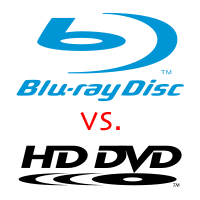
Even for a tech-minded guy like me, I get easily confused on this debate. What is the difference between these two DVD technologies? Big companies are throwing lots of time and money behind two competing formats: Blu-Ray and HD-DVD.
And there are lots of important technical differences. There are transfer rates, audio and video codecs and video systems. But what's it all mean?
First, how they differ from the DVDs you currently have on your shelf. The new formats have noticeably better video and audio qualities, hold more video and audio, can play them back with better performance and will hold content that you can really show off on your hot new HDTV.
So what's the difference between the two? Simply put, Blu-Ray is the better quality format. It holds almost twice as much data and video and plays it back at a better quality than HD-DVD. To put it in perspective, a typical Blu-Ray DVD can hold almost six times the video of a regular DVD and almost twice the video of an HD-DVD.
So what's the big deal? Blu-Ray is better, so it will win out, right?
Well, not necessarily.
The debate comes in over cost. More companies (Toshiba, NEC, Microsoft, Intel) have put their weight behind HD-DVD than they have for Blu-Ray (Sony). This is because anyone who wants to put their products on Blu-Ray will need to purchase new facilities to do so. And they pass the cost onto you, the consumer, to the tune of roughly $5-10 more per disc. This also means that the players themselves will cost considerably more, too (roughly $500 vs. $1,000-$1,800).
After reviewing these facts, some of you may be getting flashbacks to the Betamax vs. VHS battle of twenty years ago. In many ways, it's very similar, with some already predicting defeat for Blu-Ray (and Sony).
So who will win? Frankly, it's still too early to tell. One major determining factor is the recent release of the newest generation of video game consoles this winter. Sony, backers of Blu-Ray, put out PlayStation 3. Microsoft, backers of HD-DVD, put out XBox 360. The Consumer Electronics Show this year saw the battle raging on, though some are predicting it is in the final throes.
Either way, consumers will get better quality DVDs. There's no question that these formats are leaps and bounds beyond traditional DVDs. The only questions left are over quality and cost. And millions of high-tech companies' dollars are on the line to answer them.
Tech Talk:
| Blu-Ray | HD-DVD |
| Sponsor: Sony | Sponsors: Toshiba, NEC, Microsoft, Intel |
| Backing studios: Paramount, Warner Bros. | Backing studios: New Line, Paramount, Universal, Warner Bros. |
| Capacity: 50 GB (dual layer), 23 hours of standard definition content, 9 hours of high definition content | Capacity: 30 GB (dual layer), 13.8 hours of standard definition content, 5.4 hours of high-definition content |
| Video formats: MPEG-2, VC-1, H.264 | Video formats: MPEG-2, VC-1, H.264 |
| Audio formats: Dolby Digital (AC-3), PCM, DTS | Audio formats: Dolby Digital (AC-3), PCM, DTS |
| Audio quality: 640 kb/s | Audio quality: 448 kb/s |
| Region codes: 3 | Region codes: 0 |
2 comments:
One difference in the gaming systems: PS3 comes ready to play blu-rays. You need to buy an add-on for the xbox 360 and the suckas ain't cheap (199.82 on amazon.com).
Some think that other indsutries besides gaming will decide the fate of these intermediate technologies. I say forget investing in DVDs and wait for steaming and downloadable content.
Post a Comment